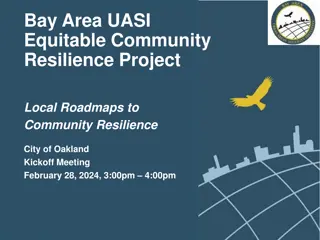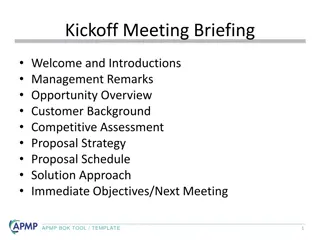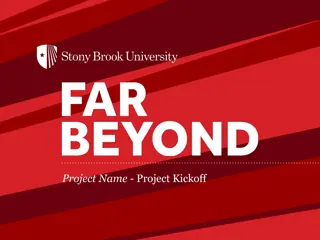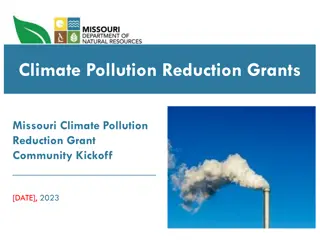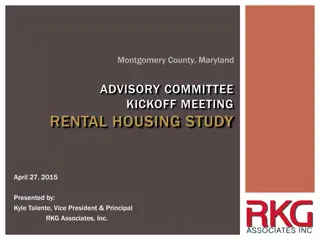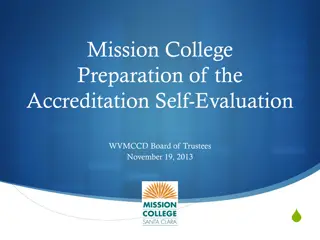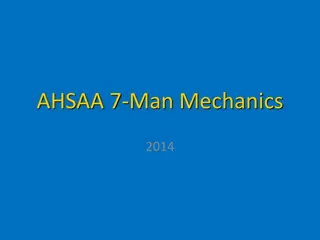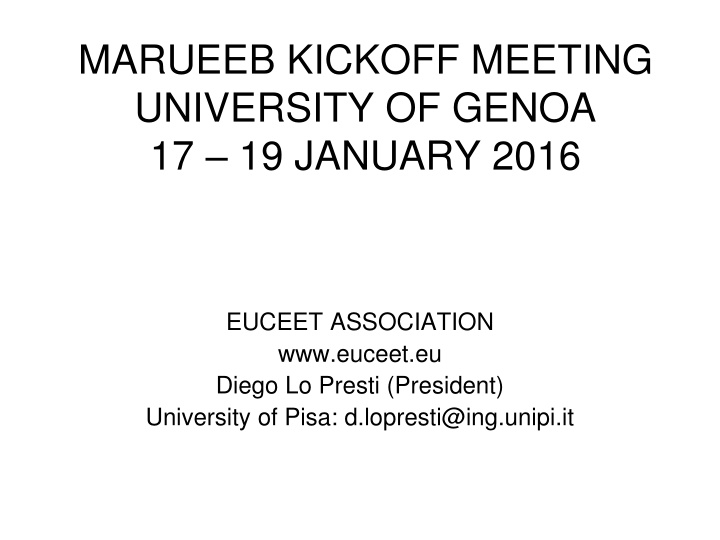
Engineering Association Overview and Contributions
Explore the founding and structure of the EUCEET Association, which promotes sustainability in engineering education. Learn about key members, universities involved, and significant contributions in the field. Discover specialized programs in energy engineering and building performance offered by member institutions.
Uploaded on | 0 Views
Download Presentation

Please find below an Image/Link to download the presentation.
The content on the website is provided AS IS for your information and personal use only. It may not be sold, licensed, or shared on other websites without obtaining consent from the author. If you encounter any issues during the download, it is possible that the publisher has removed the file from their server.
You are allowed to download the files provided on this website for personal or commercial use, subject to the condition that they are used lawfully. All files are the property of their respective owners.
The content on the website is provided AS IS for your information and personal use only. It may not be sold, licensed, or shared on other websites without obtaining consent from the author.
E N D
Presentation Transcript
MARUEEB KICKOFF MEETING UNIVERSITY OF GENOA 17 19 JANUARY 2016 EUCEET ASSOCIATION www.euceet.eu Diego Lo Presti (President) University of Pisa: d.lopresti@ing.unipi.it
Founded under Belgian Law on 12thMarch 2007 The Association is an outcome of the sustainability strategy outlined in the application for EUCEET III project (2006-2009) Statutes and bylaw were prepared by a Task Force (Jean Berlamont and Iacint Manoliu) designated by the EUCEET MC in Vilnius, on 8 December 2006
Administrative Council: Prof. Diego Lo Presti (University of Pisa) President Prof. Laurie BOSWELL (City University London) - Vice-President Prof. Jean BERLAMONT (Catholic University Leuven) Treasurer Prof. Vladimir ALEKHIN (Ural Federal University) Prof. Piotr BERKOWSKI (Wroclaw Technical University) Prof. Linas JUCKNEVICIUS (Vilnius Technical University) Prof. Jose TURMO (Universitat Polit cnica de Catalunya Barcelona) Prof. Iacint Manoliu (Technical University of Civil Engineering, Bucharest). Secretary
MAIN CONTRIBUTIONS ESTP ENPC CITY UNIVERSITY KU LEUVEN UPC UTCB WROCLAW TECHNICAL UNIVERSITY CZECH TECNICAL UNIVERSITY PRAGUE UNIVERSITY OF PISA
ESTP The ESTP Paris is accredited for the engineering degree at master s level in 5 specializations. 1 specialization energy engineering for sustainable construction is entirely focused on energy efficiency in buildings. It is a French one tiers engineering degree where students are admitted to the 3rd year in higher education after a first 2 year degree in higher education. So the whole last 3 years of the ESTP engineering programme are dedicated to this topic. The other 4 ESTP specializations offer a last year in-depth study in 11 fields, one of which is engineering and energy efficiency . On the other hand, the ESTP research is grouped in the Institut de Recherche en Constructibilit . One of the research topics is energy efficiency in buildings .
ENPC MASTER OF ENGINEERING (CIVIL ENG.), 2 subjects (Prof. Bruno Peuportier) : Energy performance of buildings (4 ECTS) Energy performance of buildings, application (3 ECTS) . ADVANCED MASTERS PROGRAMMES 2 dedicated programs for graduated and young professionals Real Estate, Buildings, Energy (IBE) The Advanced Master programme is divided into 10 weeks and includes a study trip in Europe. The programme is delivered from January to December. In parallel with or following the 10 teaching modules, students carry out a company-based assignment lasting a minimum of four months, on which they produce a professional dissertation for presentation to a jury panel. Integrated design and lifecycle of building and infrastructure (BIM) Program: one week/month from September to July. In parallel or following teaching modules, auditors conduct a mission in business leading to the writing of a professional thesis defended before a jury. The subject of the thesis refers to topics covered in the course and allows the application of concepts to solve a business problem. The curriculum aims to: Train professional manager to a project in the context of digital model and use BIM to design an integrated manner of construction and operation of projects for new buildings, existing, or renovation, taking into account, in an approach "Buildable", constraints and models of the various players, particularly energy and environmental requirements. To help the various professionals to "work together" through an interoperable information system, to meet all the technical, regulatory and environmental, with controlled costs.
CITY UNIVERSITY LONDON City University of London offers two Masters programmes, which are compliant with the Bologna Process and include the latest technical innovations related to energy efficient buildings. They also provide a capacity building facility for professional persons wishing to enter the energy industry. 1. Energy and Environmental Technology and Economics. Topics include: managing conventional energy production, renewable energy, price regulation, low carbon emission, risk management assessment, user and supplier perspective, high level national and international policies and economics, etc. The programme provides the opportunity of retraining in technical and scientific content and management as well as designing course content and assessment. 2. Renewable Energy and Power System Management. Topics include; power system design, management and economics, power system simulation and power conditioning, environmental law, integration of renewable energy schemes to reach low pollution targets, impact on existing national grid.
KU LEUVEN BACHELOR BUILDING PHYSICS: HEAT AND MASS TRANSFER MASTER CONSTRUCTION OF BUILDINGS: performance assessment BUILDING SERVICES (part 1) heating, ventilation BUILDING SERVICES (part 2) cooling and air conditioning BUILDING SIMULATION URBAN PHYSICS
URBAN PHYSICS AIMS Students are capable of assessing the urban physical quality of buildings and the urban environment, identifying urban physics problems, and analyzing and evaluating building and urban designs based on the urban physics parameters wind, solar radiation and rain with respect to wind comfort and wind safety around buildings, facade surface soiling and weathering by wind-driven rain, and the urban heat island effect. Students learn: Detailed knowledge of basic wind-flow patterns around buildings, wind nuisance, and wind-driven rain on building facades. Basic knowledge of the urban heat island effect to identify and mitigate this problem in realistic situations. dentification and assessment of wind nuisance situations, their origin, and of the effectiveness of various remedial measures. Identification of facade surface soiling and weathering by wind-driven rain, their origin, and of the effectiveness of various remedial measures. Building Physics Section
UPC Energy efficient buildings are discussed in two different subjects corresponding to the bachelor degree in Public Works and the master degree in Civil Engineering. The contents on Energy Efficient Buildings are presented in the courses on "Building and Prefabrication" (Public Works) and "Building Structures" (Civil Engineering master), the later taught in English. About six hours of face-to-face teaching is devoted to the subject, while the students also have to solve a problem concerning thermal insulation of buildings. The teaching includes concepts on the general physics of buildings, thermal conductivity and behavior, thermal insulation techniques and materials, psychometry and vapor condensation, interior environment, and sustainable solutions for Energy efficient construction. In addition to the time specifically devoted to this teaching, issues on sustainability and energy efficiency percolate throughout the entire courses.
UTCB At the Building Services Engineering Faculty from the Technical University of Civil Engineering Bucharest, Romania, there is a specialized master (scientific field: Building Services Engineering) entitled Energy Efficiency of Building Systems, functioning since 2009. The master provides 240 ECTS in 2 years of study, the language of teaching being Romanian. Starting with the academic year 2016-2017, the same master (with a slightly modified curricula) will be provided in the French language, under the name Efficacit nerg tique des installations techniques du b timent.
UTCB 1 st Year of study Numerical Analysis and programming Data acquisition and processing techniques Optional A: A1. Modelling and simulation of technical systems in buildings A2. Fluid Mechanics complements A3. Advanced Engineering Thermodynamics Dynamic behavior of thermal-hydraulic systems Comfort exigences and air quality in indoor environments Renewable energy sources utilization in buildings Heating and cooling by radiation Fire-safety systems and equipment Optional B: B1. Small-scale cogeneration B2. Air distribution in rooms and ventilation efficiency Air-conditioning of multi-zonal buildings Reliability and maintenance of building systems Acoustics and noise reduction in buildings and building systems 2nd Year of study Energy consumptions in buildings heating and domestic hot water Energy consumptions in buildings ventilation, air-conditioning and refrigeration Energy audit, expertise and certification of buildings Inspection of HVAC systems Optional C C1. Passive house design C2. Heat and mass transfer through building envelope Building management systems (BMS) Research & design activities for the master thesis Writing of the Master thesis
WROCLAW TECHNICAL UNIVERSITY MASTER IN CE ADVANCED BUILDING PHYSICS (15 + 15 HRS) TECHNICAL SHEET AVAILABLE SUSTAINABLE HOUSING (15 + 15 HRS) TECHNICAL SHEET AVAILABLE
CZECH TECNICAL UNIVERSITY PRAGUE UCEEB was founded as an independent institute of the Czech Technical University in Prague under the auspices of four departments Civil engineering, Mechanical Engineering, Electrical Engineering and Biomedical Engineering. The Centre's goal is to leverage synergy effects of research activities of the individual departments which are related to energy efficient buildings. UCEEB is a reaction to one of the European Union's largest priorities aimed at optimisation of energy efficiency of buildings. The new centre should also have better opportunities to participate in European scientific projects, such as the Joint Technology Initiative on Energy Efficient Buildings, which is based on the EU's targets for carbon dioxide emissions. It is clear that sustainable building is not just a trend or fashion, but a necessity. That is why we look at energy efficient buildings as a whole.
UNIVERSITY OF PISA Courses: Full Professor: BUILDING PYHSICS (thermodynamics, heat transfer, thermal insulation and energy consumption in buildings, humid air, indoor hygrothermal comfort, cooling of buildings, moisture behaviour of building components, daylighting and artificial lighting, room acoustics, sound insulation in buildings); LIGHTING AND APPLIED ACOUSTICS (fundamentals of lighting, day and artificial lighting of rooms and workplaces, architectural and urban lighting, light pollution; fundamentals of acoustics, transmission loss of walls, sound insulation in buildings, room acoustics and reverberation time, environmental noise); Fabio Fantozzi Assistant Professors: Franceso Leccese Giacomo Salvadori THERMAL SYSTEMS IN BUILDINGS (heating and air conditioning systems in buildings, mechanical ventilation and indoor air quality, solar systems in buildings, low enthalpy sources, energy performance of buildings and technical standards, outline of thermal systems safety and others). PhD & Fellows: Teresa Cervino Michele Rocca




